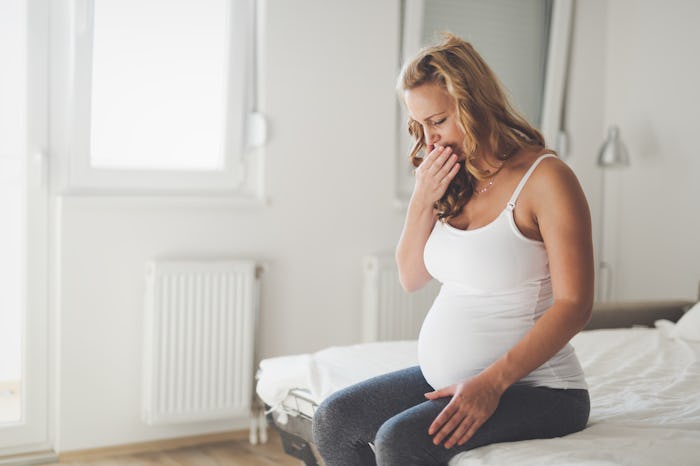Life
This Is Why You Want To Avoid A Listeria Infection At All Costs When You're Pregnant
When you get pregnant, eating soft cheeses or deli meat suddenly becomes out of the question because of potential listeria infection concerns. But how does a listeria infection during pregnancy affect your baby, really? Well, the consequences can be dire.
For unborn babies, a listeria infection can be deadly. While a listeriosis infection may only cause mild, flu-like symptoms for the mother, a fetus may endure miscarriage, stillbirth, or lifelong health complications from a listeria infection, as explained by Foodsafety.gov. Those potential health complications are serious, too. Intellectual disabilities, paralysis, seizures, and blindness are only a few of the major consequences babies may face from listeriosis, as explained by the American College of Obstetricians and Gynecologists (ACOG). Brain and blood infections, as well as damage to the kidney, heart, and brain are potential problems as well, according to ACOG. Because of these potentially grave consequences, it's crucial for pregnant women to avoid contracting a listeria infection, to the best of their ability.
Listeria is a hearty bacteria that can survive cold or even freezing temperatures. A listeria infection is a type of bacterial illness contracted from eating certain foods, as explained by the Mayo Clinic. Deli meats that were not properly processed, as well as milk products that have not been pasteurized, are the most common culprits, as the site further noted.
Because of its ability to survive extreme temperature, this bacteria is especially susceptible to contaminating some part of the food growth and delivery process. For starters, the listeria bacteria occurs naturally in soil and water, and it can contaminate raw vegetables this way, as noted in Live Science. Animal manure, a common fertilizer, is another potential carrier of listeria, and it doesn't stop at the ground level. Listeria can live for years inside the equipment of a food processing plant, as further noted by the site. "It's a pathogen that's particularly problematic in food-processing plants because it really likes cold, moist, dark environments," said Benjamin Chapman, a food safety expert at North Carolina State University, to Live Science. The bacteria's resilience is part of what makes it so dangerous, because it can affect so many levels of the food growth, processing, and delivery process.
Learning how to avoid listeria basically means adding a few more foods to your do-not-eat list during pregnancy. Soft cheeses, raw milk, raw sprouts, cut melons left at room temperature, hot dogs, cold cuts, and shelf-stable seafood are all potential carriers of the listeria bacteria, according to the Centers for Disease Control and Prevention (CDC). In addition to these common foods, keep an eye on the news. Foods such as ice cream, packaged salads, and even frozen vegetables have caused multi-state listeria outbreaks in the past three years or so, as noted by the CDC.
But even if you're scrupulous about avoiding soft cheese and stay up to date on all potential food hazards, you're still more susceptible to the infection than most people. Because pregnant women are 20 times more likely to get listeria than the overall population, it's crucial to know the symptoms of listeriosis, according to the ACOG. Headaches, stiffness in the neck, convulsions, and balance problems are all potential signs of a listeria infection, according to the Mayo Clinic. It's important to remember that these symptoms may be mild in a healthy adult, and they may take 30 days or more to appear after the consumption of contaminated food, as further noted in the Mayo Clinic.
If this is freaking you out, remember that listeria infections are thankfully rather rare in most areas. For instance, of the 4 million pregnancies that occur in the United States each year, only about 200 of those women will experience a case of listeriosis, according to The Bump. Chances are, your caution around deli meats will pay off and listeria won't be a concern for you or your baby.
Check out Romper's new video series, Bearing The Motherload, where disagreeing parents from different sides of an issue sit down with a mediator and talk about how to support (and not judge) each other’s parenting perspectives. New episodes air Mondays on Facebook.
